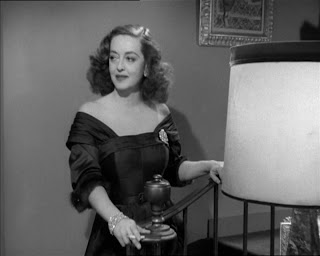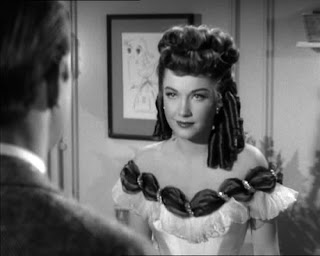Directed by: Joseph L. Mankiewicz
Written by: Mary Orr (short story), Joseph L. Mankiewicz (written by)
Starring: Bette Davis, Anne Baxter, George Sanders, Celeste Holm, Gary Merrill, Marilyn Monroe, Thelma Ritter
WARNING: Plot and/or ending details may follow!!!
I don't know what it was about 1950. Perhaps filmmakers had sufficiently recovered from the destruction of WWII to finally take stock of themselves, but it is in this year that Hollywood suddenly became self-aware; and it apparently didn't like what it saw. Billy Wilder's Sunset Blvd. (1950) is cinema's most scathing satire of Hollywood's demented and destitute moral values. Likewise, Nicholas Ray's In a Lonely Place (1950) demonstrates how the studio system snuffs out genuine talent through its intent upon "selling popcorn." But it was All About Eve (1950) that truly took America by storm that year, uniting an ensemble of the industry's most charismatic stars and giving each of them acerbic mean streak that is both wonderfully compelling and entertaining. Though the film, scripted and directed by Joseph L. Mankiewicz {who is also responsible for The Ghost and Mrs. Muir (1947) and Sleuth (1972)}, specifically concerns itself with the theatre, the parallels to Hollywood are unmistakable, and such is the screenplay's apparent distaste towards the film industry that I'm almost surprised of its success.
 On the brightly-lit stages of Broadway, respected but aging theatre star Margo Channing (Bette Davis) clings extravagantly to roles for which she is far too old; as though Mankiewicz and Billy Wilder were exchanging ideas, you can almost see her turning into Norma Desmond a few years down the track. One night, Margot is introduced to ostensibly her biggest fan, a meek and sincere young woman named Eve Harrington (Anne Baxter) – now, remember that name! Had I known beforehand that Eve is considered one of American cinema's finest villains, the first half of the film would have severely confused me – what detestable qualities could possibly be exhibited by this shy, modest and frankly adorable admirer of theatre? I decided that the mutual looks of contempt with which Margo and Karen (Celeste Holm) greet Eve's theatre award (a less-prestigious version of the Oscars) were merely the result of unfounded jealousy, and their resentment that such a modest girl could have received the high honour. When the penny finally dropped, oh, how I felt like a fool!
On the brightly-lit stages of Broadway, respected but aging theatre star Margo Channing (Bette Davis) clings extravagantly to roles for which she is far too old; as though Mankiewicz and Billy Wilder were exchanging ideas, you can almost see her turning into Norma Desmond a few years down the track. One night, Margot is introduced to ostensibly her biggest fan, a meek and sincere young woman named Eve Harrington (Anne Baxter) – now, remember that name! Had I known beforehand that Eve is considered one of American cinema's finest villains, the first half of the film would have severely confused me – what detestable qualities could possibly be exhibited by this shy, modest and frankly adorable admirer of theatre? I decided that the mutual looks of contempt with which Margo and Karen (Celeste Holm) greet Eve's theatre award (a less-prestigious version of the Oscars) were merely the result of unfounded jealousy, and their resentment that such a modest girl could have received the high honour. When the penny finally dropped, oh, how I felt like a fool! 
8/10
Currently my #4 film of 1950:
1) Sunset Blvd. (Billy Wilder)
2) Harvey (Henry Koster)
3) In a Lonely Place (Nicholas Ray)
4) All About Eve (Joseph L. Mankiewicz)
5) The Asphalt Jungle (John Huston)
6) Stage Fright (Alfred Hitchcock)
7) Rashômon (Akira Kurosawa)
"Much of the fun of the film depends on a casting twist--making Baxter the bitch and Davis the doe-eyed victim. The dialogue is sharp and justly famous, though writer-director Joseph L. Mankiewicz has trouble putting it into the mouths of his actors: nothing sounds remotely natural, and the film is pervaded by the out-of-sync sense of staircase wit--this is a movie about what people wished they'd said. The hoped-for tone of Restoration comedy never quite materializes, perhaps because Mankiewicz's cynicism is only skin-deep, but the film's tinny brilliance still pleases."
Dave Kehr, Chicago Reader
"Set in the Broadway jungle rather than among the ‘sun-burnt eager beavers’ of Hollywood, Joseph L Mankiewicz’s film dissects the narcissism and hypocrisy of the spotlight as sharply as Wilder’s, but pays equal attention to the challenges of enacting womanhood. All About My Mother (not to mention Showgirls) would be unimaginable without it. Anne Baxter is Eve Harrington, the wide-eyed stage-door hanger-on who insinuates her way into the world of Bette Davis’ sacred monster, Margo Channing; butter-might-just-melt meets gin-hold-the-tonic."
Dave Walters, Time Out London
"For years, Broadway had maintained the reputation of being a nobler art than cinema, but All About Eve ruined Broadway's fame. As the Hays office loosened up, Hollywood began "stealing" Broadway's adult subject matter, leaving it without its unique trademark. All About Eve radically redefined the orthodox view of a sacrosanct theater... Aside from attacking Broadway, the film defended Hollywood against the encroachment of television. In one of the great one-liners, Sanders tells Monroe: "That's all television is, my dear. Nothing but auditions." All About Eve while ostensibly about Broadway, was in actuality an elaborate editorial praising the Hollywood system."
Emanuel Levy






_poster.jpg)


2 comments:
When I was getting into classic movies when I was little, All About Eve was one of the first that I saw. I thought it was a great movie then, but not that long ago I decided to re-watch it and WOW. I think it's definitely one of the greatest movies... ever. The dialogue is fantastic, especially that delivered by George Sanders during that scene in Eve's apartment. And as for Bette's performance... you know you're watching a class A actress. I remember when I was little I thought Anne Baxter's performance was somewhat wooden, and upon re-watching it I've given her a little more credit. Whenever she exposes her "true self" and takes down the facade, her acting improves. Then I realize that the other scenes were supposed to look like forced acting.
Just a theory... but the 50s is when television really started to become popular and people lost interest in going to the movies because they could watch TV at home. As a result, studios stopped allowing movies to be aired on TV for awhile (British movies still aired) and pulled out the big guns when it came to making better, more interesting movies come to theaters.
Yuh. I don't care for it. It's not a very visual movie (or rather: cinematic), which I don't care for very much. Not a bad movie, but it doesn't really match my sensibilities at all. I'd give it a firm 6/10.
Post a Comment